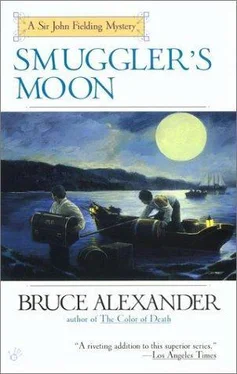Bruce Alexander - Smuggler's Moon
Здесь есть возможность читать онлайн «Bruce Alexander - Smuggler's Moon» весь текст электронной книги совершенно бесплатно (целиком полную версию без сокращений). В некоторых случаях можно слушать аудио, скачать через торрент в формате fb2 и присутствует краткое содержание. Жанр: Исторический детектив, на английском языке. Описание произведения, (предисловие) а так же отзывы посетителей доступны на портале библиотеки ЛибКат.
- Название:Smuggler's Moon
- Автор:
- Жанр:
- Год:неизвестен
- ISBN:нет данных
- Рейтинг книги:4 / 5. Голосов: 1
-
Избранное:Добавить в избранное
- Отзывы:
-
Ваша оценка:
- 80
- 1
- 2
- 3
- 4
- 5
Smuggler's Moon: краткое содержание, описание и аннотация
Предлагаем к чтению аннотацию, описание, краткое содержание или предисловие (зависит от того, что написал сам автор книги «Smuggler's Moon»). Если вы не нашли необходимую информацию о книге — напишите в комментариях, мы постараемся отыскать её.
Smuggler's Moon — читать онлайн бесплатно полную книгу (весь текст) целиком
Ниже представлен текст книги, разбитый по страницам. Система сохранения места последней прочитанной страницы, позволяет с удобством читать онлайн бесплатно книгу «Smuggler's Moon», без необходимости каждый раз заново искать на чём Вы остановились. Поставьте закладку, и сможете в любой момент перейти на страницу, на которой закончили чтение.
Интервал:
Закладка:
“Well,” said I, ”I thought it a bit far-fetched. After all, a dogsbody? an errand boy? You seemed, rather, to be describing me.”
“Aw, now you’re not being fair to your own self.”
Thus, in friendly railery, we did continue our interview at the George to the very end, when, having finished my coffee, I prepared to take my leave.
“You can tell Sir John,” said the constable, ”that I’ll continue to find out what I can about the trade hereabouts. Tonight I’ll head over to Alfred Square. I understand it’s sort of a gathering place, so I’ve heard.”
“Well, watch out if you do,” said I, ”for I’ve heard that it’s just the part of town to be avoided-a robbery a week and a murder a month.”
“Sounds just like dear old Bedford Street in Covent Garden, so it does. I think I’ll like it just fine.”
On that I departed.
My interview with Mr. Perkins had not lasted near as long as I expected, and so I decided to take a bit of time and explore the town of Deal. I had seen some of it, of course, from the window of Lord Mansfield’s coach. Yet the world seen from a coach window is simply a picture that moves. Where are the smells, the sounds, of the place?
Well, they were indeed present as I set off down High Street. I mixed with the crowd of buyers as they moved in and out of the rich shops along the way. There was a certain indefinable but real sense of prosperity and well-being among them. It was not so much what was said as how it was said. No doubt they gossiped of family, friends, and workplace, as they did in most other towns and cities. Nevertheless, they did so with smiles upon their faces and laughter in their voices; they did not go about muttering and cursing, as they seemed so often to do in London.
As for the smell of the place, there could be no doubt: it was the smell of the sea. I soon saw my way down to Beach Street, and I took it. Once there, I was immediately touched by the great flocks of gulls, flying over sea and shore and walking about upon the narrow strip of beach that ran along the cobblestone street. It seemed that whenever one of the great gray or white birds landed, another would take off. I wondered, were there not more gulls than people in Deal? Not far offshore, a number of boats bobbed in the tide-though not so many as I might have expected, for Deal was known then, as it is now, as a fishing port. Then, of a sudden, did it come to me that because it was not long past midday, the boats might indeed still be out upon the sea; perhaps they stayed out for days at a time. The smell of the sea and the fish was all about me, a strong odor even upon the walkway. I did realize at last that it came not just from the beach and beyond, but from ahead, as well, for there, at the next corner, were stalls which sold all manner of seafood to the citizenry, shellfish and finny fish, even eels and skates. I paused and surveyed the vast array of God’s water creatures. What would they taste of? Why, of the sea, of course, but in truth, I had not tasted much seafood at that time in my life. I had no clear sense of it. Reluctantly, I continued on my way. I went on to the next street and the next. Then, when Beach Street ended, the shore, of course, did not. And so I crossed over and walked along the water line. What a grand thing it would be to live one’s life by the sea and take such walks every day!
I had not gone far when I spied a vast structure back somewhat from the shore. Low and hulking it stood, with many cannon pointed out to the sea. I concluded immediately it was Deal Castle, where Dick Dickens lorded it over an idle force of twenty customs men. Did those who accepted him in the Customs Service not know his history? Did Mr. Albert Sarton not know it? He had spoken of him (without identifying him by name) quite respectfully. What if I were to return with the news that the local Customs Officer was once indeed actively involved in smuggling? Would he and Sir John suspect, as I did at that moment, that perhaps Dickens had only pretended to leave the owling trade? It could well be, thought I, that Dick-and perhaps his customs men, as well-were not near so idle as they seemed.
Thus my thoughts as I gazed upon Deal Castle. Had I known more at that moment, I might not have been near so certain. Yet if I had not been so certain, I should not have hastened, as I did, to Number 18 Middle Street in order to inform Sir John of what I had learned about the local customs officer. And had I not hastened, I might have missed him altogether.
Knowing no better way, I returned to the residence of Mr. Sarton just as I had come from it. No doubt there was a shorter route, but I did not know it, nor did I have time to ask it. I felt a strange urgency to Middle Street. Where before I had ambled, I now jog-trotted. Even there along High Street I moved at a fast pace through the crowd of local gentry, narrowly avoiding collisions, dashing at full speed past the Good King George, the inn where I had learned all from Mr. Perkins. And at last to Middle Street where, to my uneasy surprise, I spied a coach waiting at one of the houses halfway to the next street. I feared the worst when I saw that it waited before Number 18.
Upon the box, there in the driver’s seat, sat Will Fowler, he of the welcoming speech who had acted as guide to Clarissa’s tour of the manor house and its grounds. Fowler talked soothingly to the two horses, calming them with his voice, as only a good driver can do. But he gave me a wave of recognition ere I knocked upon the door. Because I read the look upon his face as one of concern, I asked if there were trouble back at the house.
“I fear so,” said he, ”trouble of the worst sort.”
“And what is that?” I asked.
“Murder,” said he, ”of one of our own. I’ve come to report it and collect Mr. Sarton. That’s as it should be done, with the magistrate, or so I was told.”
“May Sir John and I return with you?”
“Already been asked, already been granted.”
I nodded and went to the door, banging loudly upon it and waiting just as I had before. And just as before, I heard the steady tap-tap-tap of Mrs. Sarton’s heels down the long hall. She called out to me, demanding to know who knocked. To her request I called out my name. Yet there was a lapse of some several moments before the bolt was pulled and the key turned in the lock. She had evidently forgotten who I was. We had never been properly introduced.
“Ah yes,” said she, ”I thought ‘twas you, but we can’t be too careful. Come in, come in.”
I did as she bade, and noted that she did return bolt and lock to place the moment I was inside. I gave her my thanks and followed her pointed direction into that small room to the right of the door where we had sat earlier. Then did she depart. Sir John, and he alone, occupied the space at that moment. He stood, fidgeting with his walking stick, obviously eager to be off.
“Ah, Jeremy, you’re here,” said he. ”I feared we should have to leave without you.”
“Yes, Sir John, and I bear with me important news from Constable Perkins.”
“Well, save it. I’ve important news, too. Let us wait till we are alone and may talk more freely.”
“But,” said I, ”this is information that will be of great interest to Mr. Sarton, as well. I’m sure he would want to know.”
“That may well be,” said Sir John, ”but if it came from Mr. Perkins, it must be saved. Remember, we are here as trespassers upon his private preserve. If he knew we had someone gathering information here behind his back, so to speak, he would be most displeased.”
Reluctantly, I agreed to say nothing.
“Hush now, I hear him coming. Not a word.”
“No sir, not a word.”
FOUR
The conveyance in which we were taken to Sir Simon’s manor house was of an unusual, probably local design, the like of which I had never seen in the streets of London. It was a bit like a hackney coach, though so much smaller and lighter that only two could fit comfortably in its interior. As a result, there was naught for me but to take a perch upon the box beside Will Fowler.
Читать дальшеИнтервал:
Закладка:
Похожие книги на «Smuggler's Moon»
Представляем Вашему вниманию похожие книги на «Smuggler's Moon» списком для выбора. Мы отобрали схожую по названию и смыслу литературу в надежде предоставить читателям больше вариантов отыскать новые, интересные, ещё непрочитанные произведения.
Обсуждение, отзывы о книге «Smuggler's Moon» и просто собственные мнения читателей. Оставьте ваши комментарии, напишите, что Вы думаете о произведении, его смысле или главных героях. Укажите что конкретно понравилось, а что нет, и почему Вы так считаете.












